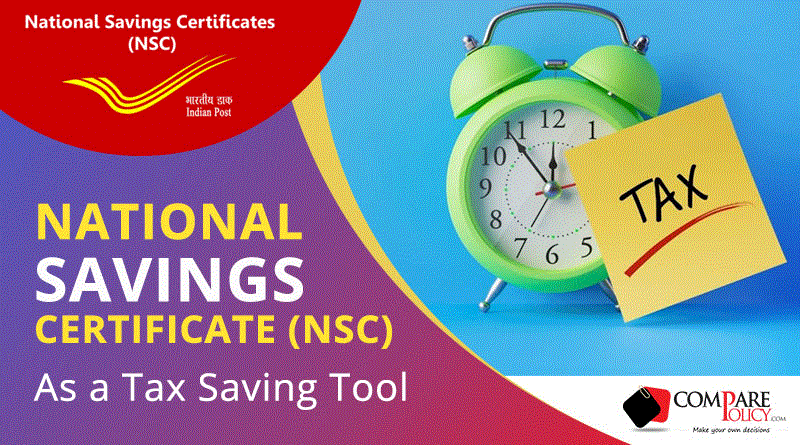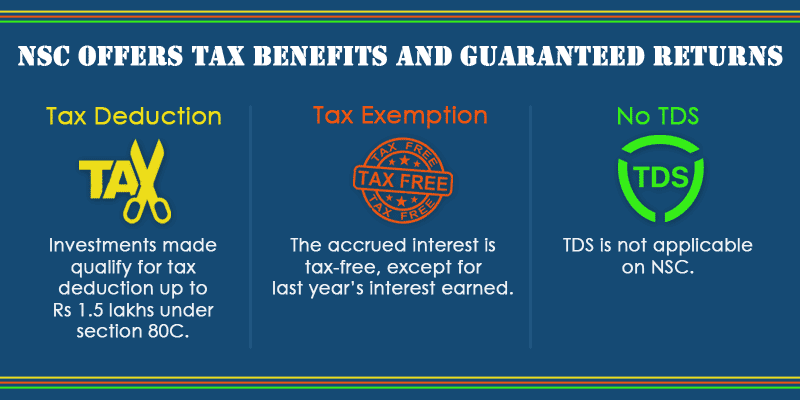National Savings Certificate (NSC) as a Tax Saving Tool
National Savings Certificate (NSC) is a popular government backed post office saving scheme. This investment scheme aims to encourage people to inculcate the habit of saving and to channelize these savings towards nation building. Investing in NSC offers you safety for the money invested along with attractive interest rate, which ensures returns on your investment. It is also one of the well-known income tax saving instruments in India. NSC can be purchased from any branch of the Indian postal service and it is issued for five year maturity.
National Savings Certificate is available in electronic mode (e-mode), w.e.f April 1, 2016 and the system of physical pre-printed certificates for NSC has been discontinued. Till the CBS system transits to e-mode, post offices may issue a physical certificate recorded in a passbook.
Table Content
- Top Reasons to Invest in NSC
- Tax Benefits under NSC
- Tax Deduction on Investment
- Tax Free Interest
- TDS Free
- Types of National Saving Certificates
- 1. Single Holder Type Certificate
- 2. Joint ‘A’ Type Certificate
- 3. Joint ‘B’ Type Certificate
- Key Points to Know Before Investing in NSC
- 1. Who can Invest
- 2. Documents Required
- 3. Tenure & Interest Rate
- NSC Rate of Interest Over the Last Five Years
- 4. Nomination
- 5. Transfer
- 6. NSC Redemption
- 7. Premature Withdrawal
- 8. Loan
- Concluding Words:
- Related posts:
Top Reasons to Invest in NSC
- National Saving Certificate offers guaranteed returns, as interest rate is backed by the government. By default, interest earned is compounded and reinvested in the scheme.
- You can start investing with a minimum amount of Rs 100 and it is thus extremely affordable to start investing in NSC.
- Nomination facility is also available.
- In case of loss or damage of certificates, you can get a duplicate copy as well.
- You can cash in your National Saving Certificates in the post office at maturity. Premature encashment is allowed, on the death of the account holder.
- Investment in NSC can be used to avail loans.
- The NSC also offers tax benefits under Section 80C of the Income Tax Act. There is no tax deduction at source (TDS).
Tax Benefits under NSC
National Saving Certificate (NSC) is a widely used tax saving instrument. Let’s discuss how NSC can help you to save tax
Tax Deduction on Investment
Investments made in NSC are eligible to claim a tax deduction up to a maximum of Rs 1.5 lakhs under section 80C of the Income Tax Act, 1961. It implies that an amount equal to annual investment in NSC would be deducted from your taxable income.
| The NSC is issued in denominations of Rs 100/500/1000/5000/10,000 and other denominations as notified by the Central Government from time to time. You also have the flexibility to buy any number of the NSC certificate of any denominations. |
Tax Free Interest
The accrued interest is tax-free, provided each year’s interest is reinvested into the NSC. When reinvested, the interest accumulated is considered as a fresh investment and thus qualifies for tax deduction under section 80C. In order to avail tax benefit on reinvested interest, you need to declare the interest earned on a yearly basis while filing your tax return. Further, you can claim tax deduction for the accrued interest (except the last year interest) under section 80C. Only the interest earned in the last year do not receive a tax deduction, as it is not reinvested in the NSC. It is, however, paid back to the investor along with the maturity value of the entire investment amount.
TDS Free
There is no tax deducted at source (TDS) on NSC.
Types of National Saving Certificates
There are 3 types of National Savings Certificates that you can purchase
1. Single Holder Type Certificate
This certificate can be purchased by an adult on an individual basis for himself/herself or on behalf of a minor. It can also be issued to a minor. The certificate holder can choose a nominee and only he/she has the flexibility to select a nominee.
2. Joint ‘A’ Type Certificate
This type of certificate is issued jointly to two adults and the money is payable to both the holders or or to the survivor upon maturity. In case of change in nominee or transfer, the permission of both the certificate holder is required.
3. Joint ‘B’ Type Certificate
A Joint ‘B’ type certificate is issued jointly to two adults and it is payable to either one of the certificate holders or to the survivor.
Key Points to Know Before Investing in NSC
1. Who can Invest
Any Indian resident individual can invest in NSC. A non resident Indian (NRI), a Hindu undivided family (HUF) and Trusts are not allowed to put money into it. The National Saving Certificates can be held either in the name of the individual or in joint names. The certificate can also be purchased in the name of a minor or on behalf of a minor.
2. Documents Required
You need to furnish an identity proof, address proof along with a photograph.Following are the documents can be used as Identity & Address proof required to invest in NSC Scheme.
| Identity Proof | Address Proof |
|---|---|
| Passport | Passport |
| PAN card | Telephone bill |
| Voter ID card | Electricity bill |
| Government ID card | Bank Statement with Cheque |
| Driving license | Certificate/ ID card issued by Post office |
| Senior Citizen ID card | – |
3. Tenure & Interest Rate
Earlier, NSC was available for two tenures of 5 years (NSC VIII) and 10 years (NSC IX). However, w.e.f December 20, 2015 NSC with 10 year tenure has been discontinued. Now, the NSC is available with only 5 year tenure. The interest rate of NSC is fixed for the entire tenure and any subsequent change in the interest rate will not change the interest earned on NSC. The prevailing interest rate at the time of purchase of NSC will be applicable for the entire period of the NSC and a fixed maturity value will be payable after 5 years. The Interest rate is compounded on a semi-annual basis, however, it gets deposited into the account every year.
At present, the interest rate on NSC is 7.8% for the third quarter (October to December) in financial year 2017-18.
NSC Rate of Interest Over the Last Five Years
| Year | Rate of Interest (per annum) |
|---|---|
| 2017-18 (Q1) | 7.9% |
| 2017-18 (Q2) | 7.8% |
| 2017-18 (Q3) | 7.8% |
| 2016-17 | 8.10% |
| 2015-16 | 8.50% |
| 2014-15 | 8.50% |
| 2013-14 | 8.50% |
| 2012-13 | 8.60% |
You would also receive interest even after the maturity, in case the certificate is not redeemed. The rate of interest applicable, will be equal to the interest accrued in saving account of post office, i.e., at present it is 4% per annum. Such interest would be payable up to a maximum of 2 years from the maturity.
4. Nomination
You can nominate anyone to your NSC certificate. You can make the nomination at the time of buying the certificate or any time prior to payment of maturity amount. In order to make a nomination, you need to fill the prescribed nomination form. You also have the flexibility to change nomination any time before payment of maturity value. The chosen nominee would receive the maturity value in case of your demise. The nominee is required to furnish the death certificate to get the redemption.
|
5. Transfer
You can transfer your NSC from one post office to another, provided you have sufficient documents to prove that the certificate/s belong to you. Moreover, you can also transfer an NSC certificate to another person.
|
6. NSC Redemption
The redemption of NSC is available after completion of 5 years. You only need to submit the certificate/s to the postmaster of the concerned post office. The postmaster would write on the back of the NSC that you have received the maturity value. It is advisable to keep a copy of all NSC’s before submitting to the postmaster that will act as a proof later on. You can also get acknowledgment of post master over the copies of NSC.
7. Premature Withdrawal
Typically, you are not allowed to redeem NSC before 5 years. However, premature withdrawal is permitted on the occurrence of the following circumstances, such as on the death of the certificate holder or when ordered by a court of law. A penalty for premature withdrawal would be applicable.
The amount you will receive, depends on the following conditions:
|
8. Loan
Once you receive the NSC from the post office, you can approach a scheduled bank, cooperative bank or cooperative credit society to get a loan. It can be used as collateral security to get the loan from the bank. After the bank approves loan, you need to visit to the post office where the postmaster will write about the pledge on top of the certificate. The bank will disburse the loan, upon receipt of the pledge certificate. The interest on the loan amount is less than an unsecured personal loan.
Concluding Words:
Investing in NSC offers you a fixed rate of interest that you will know at the time of purchase of the certificate. Additionally, a tenure of five years along with no tax deduction at source will make NSC a better choice as an investment product. An NSC offers you the assurance of returns and there is no risk involved.It also offers tax benefits where investments made qualify to claim a tax deduction up to Rs 1.5 lakhs under section 80C of the Income Tax Act. It is important to choose the right investment option for saving tax as per your financial goals and risk apetite.



Thank you for providing this information
Kindly clarify the position of nominee in case of pledge – Is nomination deemed to be cancelled when NSCs are pledges or will it stand as it is?